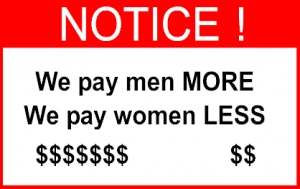In the May 3, 2016 Ask The Headhunter Newsletter, a wishful job seeker tries pandering to employers.
Question
I was reading your advice about when to bring up money in a job interview. The advice from outplacement firm Challenger Gray & Christmas here in Chicago is to never bring up compensation until an offer is made.
With the job market being more favorable to employers, they suggest that getting into the dialog too early can remove you from consideration quickly. While none of us wants to waste time going through the motions only to discover the salary may be too low, it may be more important to stay in the game as long as you can, getting them to like you. It gives you more of an opportunity to sell yourself, too.
When the salary question comes up too early in the discussion by the employer, they are not focusing on what you can bring to the table. So, when they ask you what you expect to earn, I was told to respond with, “This is a great company/organization, etc. I’m sure you’ll be fair.”
This throws the ball back in their court. If you stay in the game long enough, and they really like you, you could be offered something else or better.
Nick’s Reply
So Challenger Gray & Christmas told you to warily stroke the employer and say, “This is a great company or organization, etc. I’m sure you’ll be fair.” — hoping they’re going to like you and thus not abuse you. Pandering is not a negotiating strategy.
Why am I not surprised at the advice you were given? If your employer paid CG&C to help outplace you, consider that outplacement firms get paid whether you land a job or not. It’s unbelievable that any employer would hire a firm like this to spoon-feed pablum to the people it’s letting go.
The outplacement mistake
Let’s discuss outplacement for a minute. Here’s a cautionary note from Parting Company | How to leave your job, p. 30:
Outplacement might be helpful, but never forget that you are responsible for your next career step. Don’t be lulled into thinking that a high-priced consultant — who works for your former employer — has any real skin in your future. The skin is yours alone…
Outplacement might extend your unemployment, rather than help you land the right new job expeditiously. So, take ownership of your status, and maybe put some extra cash in your pocket. Here’s how.
Some employers will give you cash in lieu of outplacement services, if you ask. (You might have to sign a release to get it. Talk to your lawyer.) This might be the best deal, and it might help you get into high job-hunting gear faster. If you decide to spend that cash on assistance from an outplacement firm that has excellent references, that’s up to you — you’ll get to choose the firm and the counselor. If you use the money to tide you over while you conduct your own job search, that’s also up to you.
It helps to understand how the outplacement industry works. This is from Fearless Job Hunting, Book 3: Get in The Door (way ahead of your competition), pp. 12-13:
Big outplacement firms have a business model. Their objective is not to help you land a good job. The goal is to sell multi-million dollar counseling contracts to big employers that are downsizing. Almost by definition, your individual needs cannot be met by the packaged services these outplacement firms sell. If they really wanted to help you, they’d arrange personal introductions to managers who need you. They don’t do that, because that won’t win them a new gig. To win big contracts, these outplacement firms have to demonstrate a cookie-cutter process for handling thousands of newly-unemployed people. Their clients buy that process, and the more structured it looks, the more it appears to be worth… It’s too generic to work.
The last thing you need is a cookie-cutter approach to job hunting. If you want to stand out, you must make it personal. And that takes time, careful thought, and diligence. Every situation is unique, so these packaged methods you’ve been given aren’t going to work.
Outplacement that someone else chooses for you and pays for could be the biggest mistake you make when trying to land a new job after you get laid off.
Wishful thinking is not business
Let me explain why that lame, over-used response would reveal you to be naive and unsophisticated. It tells the employer that (1) you don’t know what you want or are worth, and that (2) you don’t know how to negotiate.
How businesslike is that?
Let’s say you were applying for a top sales position, and the VP of Sales asked how you’d respond to a prospective customer who asks, “How much do you want me to pay for what you’re selling?” Suppose you gave the CG&C response: “You’re a great company. I’m sure you’ll be fair.”
The VP would never hire you because you’re failing to negotiate by communicating the value of your product. You’re pretending the other guy will figure it out. If you worked for him, he’d fire you — and I’d compliment him.
Wishful thinking is not a sales strategy or a negotiating strategy. It’s childish, naive, and dangerous.
CG&C’s response is canned, silly, thoughtless and nothing but a sign that the applicant has no business in a job interview. Please: Don’t do it.
Negotiating is not a game of appeasement
Many job seekers are intimidated in interviews. And a common, visceral response to intimidation is to appease who frightens or intimidates you. Trying to be likeable is a childish form of appeasement.
 If you think trying to be likeable and saying “I’m sure you’ll be fair” will help you “stay in the game” longer, you’re going to lose because the employer will take advantage of the fact that you invested all that time — and correctly surmise that you’re going to take whatever they offer you. This is one of the oldest psychological tricks used in negotiating — look up cognitive dissonance. People have a tendency to rationalize and accept lousy job offers because they’ve spent so many hours in interviews.
If you think trying to be likeable and saying “I’m sure you’ll be fair” will help you “stay in the game” longer, you’re going to lose because the employer will take advantage of the fact that you invested all that time — and correctly surmise that you’re going to take whatever they offer you. This is one of the oldest psychological tricks used in negotiating — look up cognitive dissonance. People have a tendency to rationalize and accept lousy job offers because they’ve spent so many hours in interviews.
There’s another side to this. If you continue interviewing while knowing an offer is not likely to be in your acceptable ballpark, and then you try to “sell” the employer on a much higher salary, do you really think they’re not going to get upset with you for misleading them?
Don’t play games so you can “stay in the game,” because interviewing and hiring is not a game.
- Learn how to calculate what you’re worth, so that you’re prepared to ask for a compensation range you can defend. That demonstrates you know what you want. (See How much money should I ask for?)
- Learn how to ask the salary range of a position before you invest in interviews — that’s how to establish your negotiating position. It also shows the employer you’re not counting on being likeable; you’re prepared to demonstrate your value and to justify what you’re asking for. (See Ask this question before you agree to an interview. Yes, CG&C is so wrong that you should explicitly talk about money even before going to a job interview!)
You’re not a puppy. You don’t need to be meek and likeable so an employer might throw you a bone. I think Challenger Gray & Christmas are wasting your time and that of the employers you’re talking to — not to mention wasting your old employer’s money.
Do employers intimidate you in job interviews? Are you ready to state what you want? Do you ask what the employer is ready to pay? Have you used outplacement services? How did it work out?
: :


 The same pundits tell women that they should change their behavior if they want to be paid fairly for doing the same work as men. But the experts, researchers, advocates and apologists are all wrong. There is no prescription for underpaid women to get paid more, because it isn’t women’s behavior that’s the problem.
The same pundits tell women that they should change their behavior if they want to be paid fairly for doing the same work as men. But the experts, researchers, advocates and apologists are all wrong. There is no prescription for underpaid women to get paid more, because it isn’t women’s behavior that’s the problem. Do we need a law?
Do we need a law? Employers who don’t pay fairly will stop getting away with it when they’re required to tattoo their salary statistics on their foreheads — so job applicants can run to their competitors. Or, more likely — since new laws aren’t likely — employers will change their errant behavior when a new generation of women just up and quits. That would be quite a news story.
Employers who don’t pay fairly will stop getting away with it when they’re required to tattoo their salary statistics on their foreheads — so job applicants can run to their competitors. Or, more likely — since new laws aren’t likely — employers will change their errant behavior when a new generation of women just up and quits. That would be quite a news story. I manage a small team, but I’m pretty new to management. Now that it’s time to promote someone, I’m not happy with the criteria my HR department has given me to justify the promotion. It’s frankly nonsense. I don’t want to promote someone just because they’ve been on the job for two years. I want to use the opportunity to really assess whether they are ready for more responsibility and some new authority, and to help the employee realize what this means for them, for my department and for our company. Do you have any suggestions for how I should handle this so it will mean something?
I manage a small team, but I’m pretty new to management. Now that it’s time to promote someone, I’m not happy with the criteria my HR department has given me to justify the promotion. It’s frankly nonsense. I don’t want to promote someone just because they’ve been on the job for two years. I want to use the opportunity to really assess whether they are ready for more responsibility and some new authority, and to help the employee realize what this means for them, for my department and for our company. Do you have any suggestions for how I should handle this so it will mean something? Instead of just turning down my counter-offer and staying at $80,000, which I would’ve gladly taken, they rescinded the offer completely. The hiring manager wouldn’t even respond to my calls or e-mails, even after he said he’d be glad to discuss any questions.
Instead of just turning down my counter-offer and staying at $80,000, which I would’ve gladly taken, they rescinded the offer completely. The hiring manager wouldn’t even respond to my calls or e-mails, even after he said he’d be glad to discuss any questions. Today (March 1) we’re joined by some special guests! A big welcome to IT professionals from
Today (March 1) we’re joined by some special guests! A big welcome to IT professionals from 


 Contrary to the title of this Q&A, you’re not really afraid your millennial daughter is making a career mistake. You’re just afraid that you’re afraid she is. So I give you credit for starting a candid discussion about this, and for giving your daughter a chance.
Contrary to the title of this Q&A, you’re not really afraid your millennial daughter is making a career mistake. You’re just afraid that you’re afraid she is. So I give you credit for starting a candid discussion about this, and for giving your daughter a chance. My skill set wasn’t developed by being average, and I will not accept anything average. I make my employer lots of money. I impact the bottom line and that will cost you.
My skill set wasn’t developed by being average, and I will not accept anything average. I make my employer lots of money. I impact the bottom line and that will cost you.





